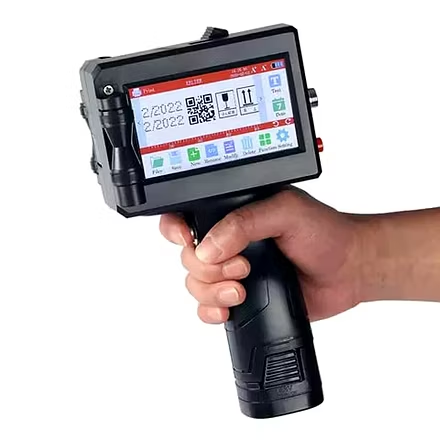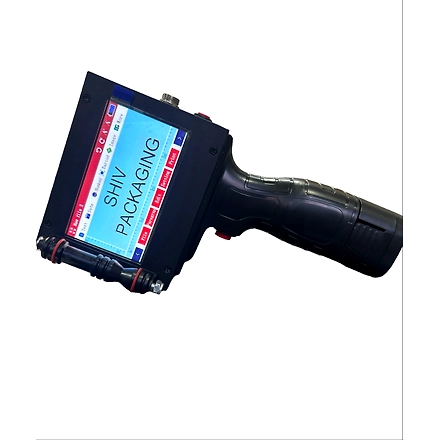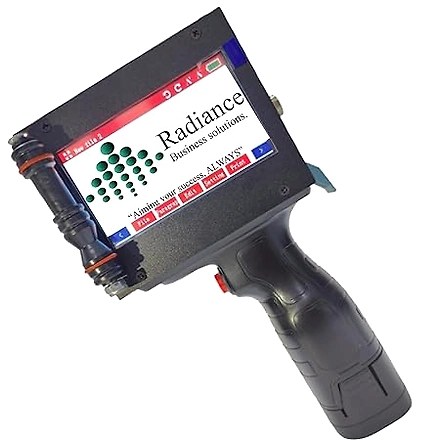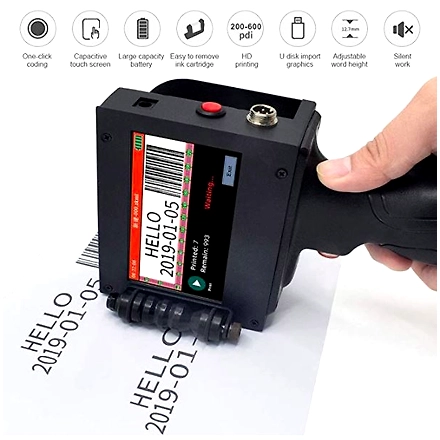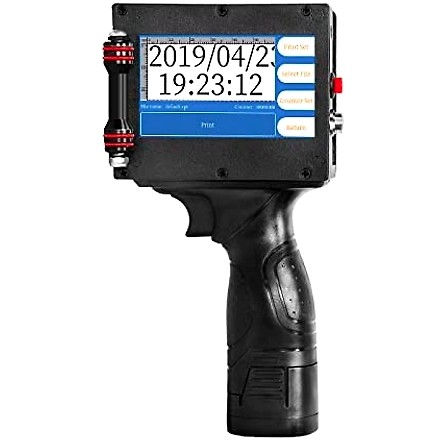Riddhi Siddhi Computers (RSC), was started in 1996 by Mr Ramesh Pukhraj Jain, with a simple & clear vision to provide the best technology at a reasonable price. RSC situated at Lamington Road (an IT Hub of Mumbai) is one of the oldest successful ...
- (+91) 9920955432
- riddhisiddhi1995@gmail.com
- 11, Ground Floor, 9, Agboatwala Building,, Near Hanuman Temple, Topiwala Lane, Lamington Road,, Mumbai, Maharashtra, India. 400007
© 2020 RIDDHI SIDDHI COMPUTERS. All Rights Reserved
RISICO 12.7MM HANDHELD THERMAL INKJET (TIJ) PRINTER for Efficient Barcode Printing
Inclusive of all taxes
You Save: 22500. Discount: 56.25%
-
Product is not available
3 Numbers
RSC-TIJ-13MM
In Stock
RISICO
Country Of Origin : China
HANDHELD THERMAL INKJET PRINTER (GUN) - 1/2" is a robust barcode printer designed for commercial, retail, and warehouse environments. Engineered for efficiency and accuracy, it offers consistent performance and easy integration.
Features:
Fast and reliable barcode printer capability
Supports 203 DPI functions
Compact body with durable construction
Compatible with standard interfaces
Ideal for B2B and bulk deployments
The target audience for Thermal Inkjet (TIJ) printers includes small to medium-sized enterprises (SMEs) and manufacturers across a wide range of industries that require high-resolution, low-maintenance, and versatile coding and marking solutions.
Key characteristics of the target audience
TIJ printers are well-suited for customers who value ease of use and clean operation over the ruggedness and speed of Continuous Inkjet (CIJ) technology, and who work in controlled, industrial environments.
Business size
SMEs and MSMEs: TIJ technology is an affordable option for companies with lower printing volumes, or those that need to keep a budget.
Larger manufacturers: Large facilities use TIJ printers for specialized tasks on their production lines, such as printing on cartons or packaging.
Operational needs
High print quality: Customers who need crisp text, high-resolution graphics, and machine-readable barcodes prefer TIJ's up to 600 DPI resolution, which is significantly higher than CIJ's typical output.
Ease of use and low maintenance: Businesses that want a simple "no-fuss" solution appreciate TIJ's cartridge-based system, which minimizes maintenance requirements and reduces downtime.
Versatility: Companies that need to print on a variety of substrates, including porous materials like paper and cardboard, as well as semi- and non-porous surfaces like plastics and metals (with the right inks), are a key audience.
Affordability: Manufacturers looking for a lower initial investment often choose TIJ. While cartridge costs can be higher over time, the lower maintenance and minimal annual service contracts can reduce the overall total cost of ownership.
Handheld and portable applications: Logistics companies and other organizations needing mobile, on-demand printing for barcodes and labels are targeted for compact, handheld TIJ models.
Primary industries served
TIJ printers are used across many different sectors for coding, marking, and labeling applications.
Food and beverage: Printing expiration dates, batch codes, and barcodes on packaging materials like cartons, labels, pouches, and foils.
Pharmaceutical and healthcare: Printing high-resolution, serialized 2D barcodes, batch numbers, and expiry dates on medical device and drug packaging to comply with strict traceability regulations.
Cosmetics and personal care: Adding information like ingredients, barcodes, and branding onto cartons and product packaging.
Packaging and logistics: Marking shipping cartons and labels with durable barcodes and variable data to ensure accurate tracking.
Electronics: Coding circuit boards and other small components with serial numbers and technical specifications.
General manufacturing: Marking parts, boxes, and building materials (like wood and bricks) with production information.
The RISICO 12.7MM HANDHELD THERMAL INKJET (TIJ) PRINTER is a robust barcode printer designed for commercial, retail, and warehouse environments. It offers fast and reliable printing capabilities with ease of integration.
Features
- Fast and reliable barcode printer capability
- Supports 203 DPI functions
- Compact body with durable construction
- Compatible with standard interfaces
- Ideal for B2B and bulk deployments
-
Additional Information
Efficiency and ReliabilityEnhance your business operations with the RISICO 12.7MM HANDHELD THERMAL INKJET (TIJ) PRINTER. This handheld thermal inkjet printer is meticulously engineered to deliver fast and reliable barcode printing, ensuring efficiency and accuracy in every task.
Versatile FunctionalityWith support for 203 DPI functions, this printer provides crisp and clear barcode prints for various applications. Its compact yet durable construction makes it ideal for diverse settings, from retail checkouts to warehouse environments.
Seamless IntegrationExperience seamless integration with the RISICO 12.7MM HANDHELD THERMAL INKJET (TIJ) PRINTER. Compatible with standard interfaces, this printer is perfect for B2B and bulk deployments, offering convenience and efficiency in barcode printing processes.
The target audience for Thermal Inkjet (TIJ) printers includes small to medium-sized enterprises (SMEs) and manufacturers across a wide range of industries that require high-resolution, low-maintenance, and versatile coding and marking solutions.Key characteristics of the target audienceTIJ printers are well-suited for customers who value ease of use and clean operation over the ruggedness and speed of Continuous Inkjet (CIJ) technology, and who work in controlled, industrial environments.Business sizeSMEs and MSMEs: TIJ technology is an affordable option for companies with lower printing volumes, or those that need to keep a budget.Larger manufacturers: Large facilities use TIJ printers for specialized tasks on their production lines, such as printing on cartons or packaging.Operational needsHigh print quality: Customers who need crisp text, high-resolution graphics, and machine-readable barcodes prefer TIJ's up to 600 DPI resolution, which is significantly higher than CIJ's typical output.Ease of use and low maintenance: Businesses that want a simple "no-fuss" solution appreciate TIJ's cartridge-based system, which minimizes maintenance requirements and reduces downtime.Versatility: Companies that need to print on a variety of substrates, including porous materials like paper and cardboard, as well as semi- and non-porous surfaces like plastics and metals (with the right inks), are a key audience.Affordability: Manufacturers looking for a lower initial investment often choose TIJ. While cartridge costs can be higher over time, the lower maintenance and minimal annual service contracts can reduce the overall total cost of ownership.Handheld and portable applications: Logistics companies and other organizations needing mobile, on-demand printing for barcodes and labels are targeted for compact, handheld TIJ models.Primary industries servedTIJ printers are used across many different sectors for coding, marking, and labeling applications.Food and beverage: Printing expiration dates, batch codes, and barcodes on packaging materials like cartons, labels, pouches, and foils.Pharmaceutical and healthcare: Printing high-resolution, serialized 2D barcodes, batch numbers, and expiry dates on medical device and drug packaging to comply with strict traceability regulations.Cosmetics and personal care: Adding information like ingredients, barcodes, and branding onto cartons and product packaging.Packaging and logistics: Marking shipping cartons and labels with durable barcodes and variable data to ensure accurate tracking.Electronics: Coding circuit boards and other small components with serial numbers and technical specifications.General manufacturing: Marking parts, boxes, and building materials (like wood and bricks) with production information. -
Reviews ()
Write a Review








